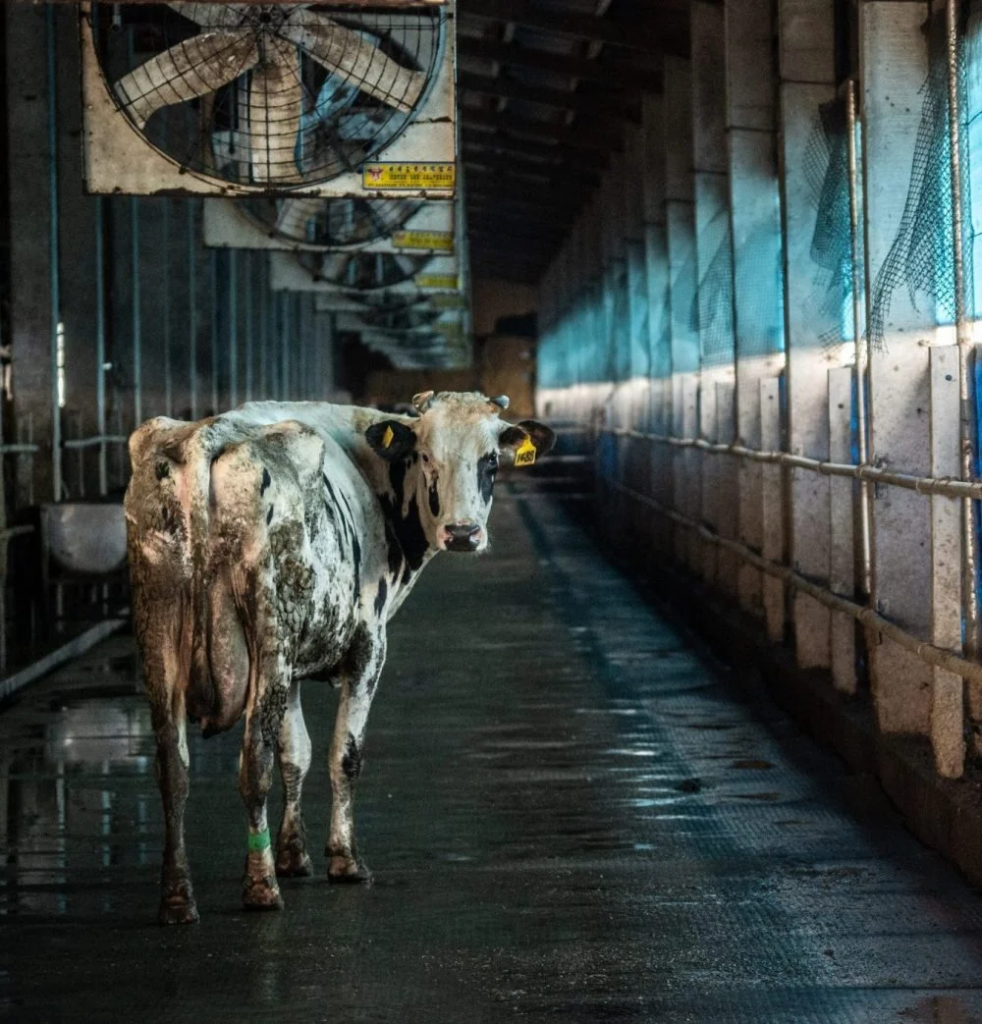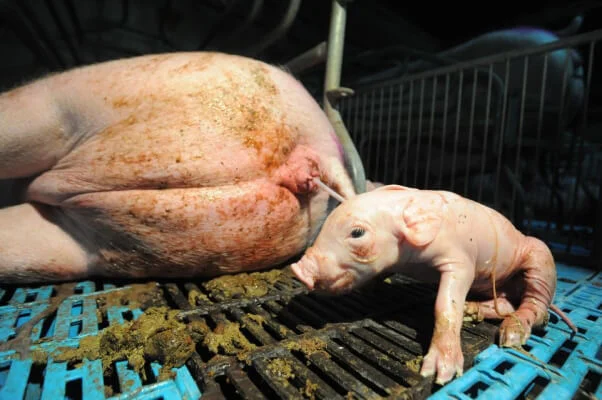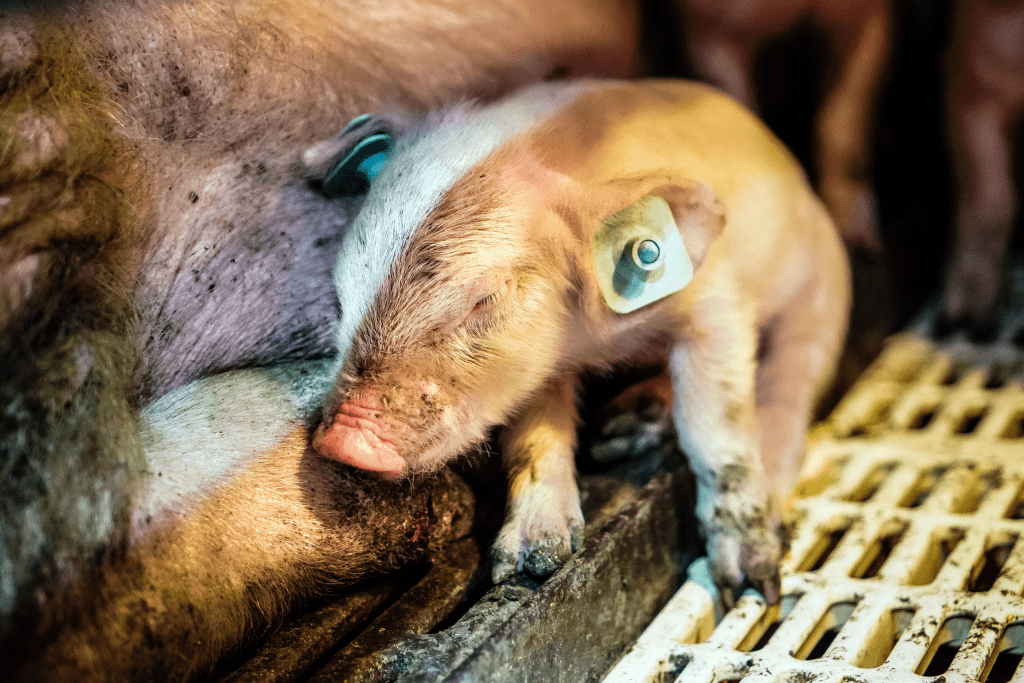A agricultura da fábrica se tornou uma prática generalizada, transformando a maneira como os humanos interagem com os animais e moldando nosso relacionamento com eles de maneiras profundas. Esse método de carne, laticínios e ovos produtores de massa prioriza a eficiência e o lucro sobre o bem-estar dos animais. À medida que as fazendas da fábrica se tornam maiores e mais industrializadas, elas criam uma severa de desconexão entre os seres humanos e os animais que consumimos. Ao reduzir os animais a meros produtos, a agricultura da fábrica distorce nossa compreensão dos animais como seres sencientes que merecem respeito e compaixão. Este artigo explora como a agricultura da fábrica afeta negativamente nossa conexão com os animais e as implicações éticas mais amplas dessa prática.

A desumanização dos animais
No centro da agricultura da fábrica está a desumanização dos animais. Nessas operações industriais, os animais são tratados como meros mercadorias, com pouca consideração por suas necessidades ou experiências individuais. Eles geralmente estão confinados a pequenos espaços superlotados, onde são negadas a liberdade de se envolver em comportamentos naturais ou viver de uma maneira que respeite sua dignidade. As fazendas de fábrica vêem os animais não como vivos, sentindo criaturas, mas como unidades de produção a serem exploradas por sua carne, ovos ou leite.
Essa mentalidade leva à normalização da crueldade. O foco em maximizar o lucro e a eficiência resulta em práticas que infligem sofrimento grave nos animais. Seja o confinamento severo de porcos em caixas de gestação, a mutilação dos bicos de galinhas ou as condições brutais sob as quais as vacas são mantidas, a agricultura da fábrica perpetua uma cultura de indiferença ao bem -estar animal. Como resultado, os seres humanos tornam -se dessensibilizados à realidade do sofrimento animal, cortando ainda mais o vínculo emocional e ético entre nós e as criaturas que exploramos.
A desconexão emocional
A agricultura da fábrica contribuiu para uma profunda desconexão emocional entre humanos e animais. Historicamente, as pessoas tinham relacionamentos mais próximos com os animais que levantaram, muitas vezes cuidando deles e desenvolvendo uma compreensão de seus comportamentos, necessidades e personalidades. Essa interação mais próxima permitiu um vínculo emocional mais profundo entre humanos e animais, que agora é cada vez mais raro na sociedade moderna. Com o aumento da agricultura da fábrica, os animais não são mais vistos como indivíduos com necessidades únicas, mas como produtos a serem produzidos em massa, embalados e consumidos. Essa mudança tornou mais fácil para as pessoas ignorar ou descartar o sofrimento dos animais, pois não são mais vistos como criaturas que merecem compaixão.
Um dos principais fatores nessa desconexão emocional é a separação física entre humanos e os animais que eles consomem. As fazendas de fábrica são grandes instalações industrializadas, onde os animais são mantidos fora de vista e frequentemente confinados a pequenas gaiolas ou canetas superlotadas. Essas instalações são intencionalmente projetadas para serem ocultas dos olhos do público, garantindo que os consumidores não sejam confrontados com a realidade da crueldade animal. Ao remover os animais da visão pública, a agricultura da fábrica desapega efetivamente as pessoas da vida dos animais que exploram, impedindo -os de experimentar o peso emocional de suas escolhas alimentares.



Além disso, a natureza processada da carne e outros produtos de origem animal obscurece ainda mais as origens animais dos produtos que consumimos. A maioria dos consumidores compra carne, ovos e laticínios em sua forma embalada, geralmente sem nenhum lembrete visível do animal de onde vieram. Essa embalagem e higienização de produtos de origem animal embotam o impacto emocional de comprar e consumir esses itens. Quando as pessoas não associam mais a comida em suas placas com as criaturas vivas de onde veio, fica muito mais fácil ignorar a crueldade que pode ter ocorrido no processo de produção.
Essa desconexão emocional também é reforçada pelas normas culturais e pela socialização que ocorre desde tenra idade. Em muitas sociedades, comer produtos de origem animal é visto como uma parte normal da vida, e o tratamento de animais em fazendas de fábrica é amplamente escondido da vista. Desde tenra idade, as crianças aprendem que comer carne é uma parte natural da vida, muitas vezes sem entender as implicações éticas por trás dela. Como resultado, a conexão emocional com os animais como seres sencientes é enfraquecida e as pessoas crescem dessensibilizadas ao sofrimento que os animais suportam em fazendas de fábrica.
O impacto dessa desconexão emocional se estende além do indivíduo. Como sociedade, nos acostumamos à idéia de os animais serem explorados para o benefício humano, e isso contribuiu para uma maior falta de empatia e compaixão por criaturas não humanas. A agricultura fábrica não apenas promove uma sensação de indiferença em relação ao sofrimento animal, mas também cultiva uma cultura em que a vida emocional dos animais é descartada ou ignorada. Essa desconexão torna mais difícil para os indivíduos enfrentar as implicações éticas de suas escolhas alimentares e incentiva uma mentalidade que vê os animais como meros mercadorias, em vez de seres vivos com valor intrínseco.
Além disso, a desconexão emocional levou a uma diminuição da responsabilidade ética que os humanos antes sentiram em relação aos animais. Nas gerações passadas, as pessoas tinham uma compreensão mais clara das consequências de suas ações, estejam criando animais para alimentos ou se envolverem com elas de outras maneiras. As pessoas eram mais propensas a considerar a vida, o conforto e o bem-estar do animal. No entanto, a agricultura da fábrica alterou essa maneira de pensar distanciando as pessoas das consequências de seus hábitos de consumo. A distância entre humanos e animais criou uma situação em que a exploração dos animais não é mais vista como algo a ser questionado ou desafiado, mas como uma parte aceita da vida moderna.

O vazio ético
A ascensão da agricultura da fábrica criou um profundo vazio ético, onde os direitos fundamentais e o bem-estar dos animais são desconsiderados em favor de maximizar os lucros e a eficiência. Essa prática reduz os animais a meras mercadorias, privando -os de seu valor inerente como seres sencientes capazes de sentir dor, medo e alegria. Nas fazendas da fábrica, os animais costumam ser confinados em espaços tão pequenos que dificilmente podem se mover, sujeitos a procedimentos dolorosos e negados a oportunidade de expressar comportamentos naturais. As implicações éticas desse tratamento são impressionantes, pois destaca uma profunda dissonância moral na maneira como a sociedade vê sua responsabilidade por criaturas não humanas.
Um dos aspectos mais perturbadores da agricultura da fábrica é o total desrespeito à dignidade inerente dos animais. Em vez de ver os animais como seres vivos com seus próprios interesses, desejos e experiências emocionais, eles são tratados como unidades de produção - ferramentas a serem exploradas para sua carne, leite, ovos ou pele. Nesse sistema, os animais são submetidos a condições implacáveis que causam danos físicos e psicológicos. Os porcos são mantidos em caixas de gestação estreitas, incapazes de se virar ou interagir com seus jovens. As galinhas estão confinadas em gaiolas de bateria tão pequenas que não podem espalhar suas asas. As vacas geralmente têm acesso negado a pastagens e sujeitas a procedimentos dolorosos, como desmaios ou encaixe na cauda, sem anestesia. Essas práticas ignoram o imperativo ético para tratar os animais com respeito, compaixão e empatia.
O vazio ético se estende além dos danos imediatos causados aos animais; Também reflete um fracasso social mais amplo em enfrentar a responsabilidade moral dos seres humanos em suas interações com outras criaturas vivas. Ao normalizar a agricultura de fábrica, a sociedade escolheu coletivamente ignorar o sofrimento de milhões de animais em favor de produtos baratos e prontamente disponíveis. Essa decisão tem um alto custo - não apenas para os próprios animais, mas também para a integridade moral da sociedade como um todo. Quando deixamos de questionar a ética da agricultura da fábrica, permitimos que a crueldade se torne uma norma aceita, reforçando a crença de que a vida de alguns animais é menos valiosa que outros.
O vazio ético da Factory Farming também é agravado pela falta de transparência em suas operações. A maioria das pessoas tem pouco ou nenhum conhecimento das condições em que os animais são criados, pois as fazendas da fábrica são projetadas para serem ocultas da visão pública. A grande maioria dos consumidores nunca testemunham os animais que sofrem nessas instalações e, como resultado, estão desconectados das implicações éticas de suas decisões de compra. A higienização de produtos de origem animal - carne, leite e ovos - obscurece a crueldade envolvida em sua produção, permitindo que os consumidores continuem seus hábitos sem lidar com as realidades éticas da agricultura da fábrica.
Esse vazio ético não é apenas uma questão moral; É também profundamente espiritual. Muitas culturas e religiões há muito ensinam a importância da compaixão e respeito por todos os seres vivos, independentemente de suas espécies. A agricultura fábrica está em contradição direta com esses ensinamentos, promovendo um ethos de exploração e desconsideração pela vida. À medida que a sociedade continua a endossar o sistema agrícola da fábrica, ela corroe a própria base desses valores éticos e espirituais, promovendo um ambiente em que o sofrimento animal é ignorado e tratado como irrelevante às preocupações humanas.
















































